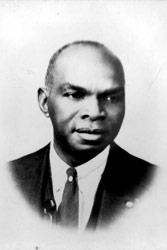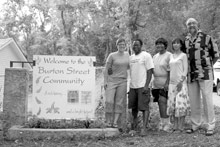Last year, Leicester resident Valeria Watson-Doost submitted a letter to Mountain Xpress about an historic building in West Asheville’s Burton Street neighborhood that was slated for demolition (see “Wrecking Ball Swings Toward Asheville Black History,” Letters, May 15, 2007). “I did research on the building … and found out that it was built in 1924 by a black man,” Watson-Doost wrote. “I later heard that he used to do carnivals in the area. … The building housed a grocery store, a beauty shop and was later the community center before the Burton Street Center was built.” But despite numerous attempts to make a case for preservation, the building was razed.

However, the memory of the man who used to do the carnivals lives on. His name was E.W. Pearson Sr., and according to Black Highlander Collection at UNC-Asheville’s Ramsey Library, he was born in 1872 in Glen Alpine, N.C., and moved to Asheville in 1906. He established the Asheville branch of the NAACP, serving as its first president, and served as the first president of the local chapters of the Universal Negro Improvement Association and the N.C. Negro Improvement Association. He is remembered for founding Asheville’s first black baseball team, the Asheville Royal Giants, in the late 1910s, according to Bill Ballew‘s A History of Professional Baseball in Asheville (The History Press, 2007). And he was the founder and organizer of an agricultural fair begun in 1914 that drew thousands to West Asheville’s Pearson Park—which Pearson also established. Despite his limited formal schooling (he didn’t make it beyond the fourth grade), he studied law, business and religion through correspondence courses and was an expert in real estate and merchandising. He died in 1946 at the age of 74.
“He used to have a store right next to the Burton Street community,” remembers Gloria Johnson, president of the Burton Street Community Association, referring to the building that was torn down last year. “He raised his family here in West Asheville.” Johnson, who says she’s lived on Burton Street since 1973, has served as president of the association for 15 years.

Pearson’s memory will be honored for a long time to come thanks to a newly installed community-identification sign at the corner of Burton Street and Atlanta Avenue. The sign project was funded through West Riverside Operation Weed & Seed, a city of Asheville initiative backed by the U.S. Department of Justice that is meant to eradicate crime and drug problems while bolstering positive community initiatives. Four young people from the area—Giovanni McKnight, Terrance McKnight, David Mays and Dominique Harris—apprenticed under mentors DeWayne Barton and Talon Mays to construct the sign, with other community volunteers contributing to the effort as well. On Aug. 9, a sign-dedication ceremony was held. Clifford Cotton, one of Pearson’s descendants, traveled from out-of-state to attend the event.
“Weed & Seed is not a program, it’s a table from which various community projects can be started,” says West Riverside Weed & Seed Coordinator Dawa Hitch, who works closely with community members in the Burton Street neighborhood and Pisgah View Apartments. The sign effort was meant to communicate a message, Hitch says: “This is a community where people care.”



I don’t know if she has seen this article. DeWayne Barton and Gloria Johnson would probably be the best contacts.
The article could be used as a lead in to discussion with them.
I hope this helps. If I come across any other info, I will contact you.
this was my grandfather
This was my great-grandfather.